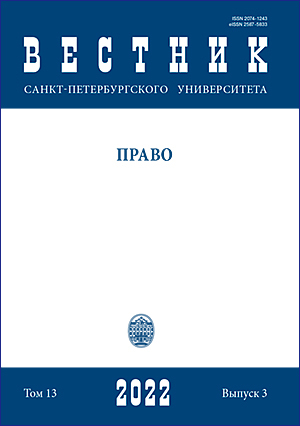First judgment of the Special Tribunal for Lebanon
DOI:
https://doi.org/10.21638/spbu14.2022.308Abstract
The article analyzes legal documents of the Special Tribunal for Lebanon, established by a United Nations Security Council Resolution in 2007 for investigating the former prime minister of Lebanon, Rafiq Hariri, in Beirut in 2005. This article examines the legal status of the Special Tribunal, its jurisdiction, and its structure. The Tribunal was established according to an agreement between United Nations and the government of the Lebanese Republic, and later adopted by the UN Security Council. Jurisdiction of the Tribunal covers territory of all UN member-states. Main attention is paid to the first Judgment, delivered by the Trial Chamber of the Tribunal in August 2020, according to which three of the accused were acquitted and one — Jamal Salem Ayyash — was condemned. The article analyzes evidence used by the Trial Chamber, in the first place utilization of data of mobile telephones, as a basis for judgment. Jamal Salem Ayyash was convicted on a basis of his identification as a user of a mobile telephone, which according to experts was used by a person who took part in the murder of Rafiq Hariri. The article also considers the political meaning of the Judgment. The Trial Chamber did not find any evidence of the involvement of the Syria government and Hezbollah leadership in the murder of Rafiq Hariri. The author points out the reasons that prevent the Tribunal from achieving better results. The most important reason is restriction of the jurisdiction of the Tribunal to only one crime and not paying attention to other political crimes committed in Lebanon in the precedent years.
Keywords:
international criminal law, international courts, Special Tribunal for Lebanon, civil war in Lebanon, international crimes, terrorism
Downloads
References
Downloads
Published
How to Cite
Issue
Section
License
Articles of "Vestnik of Saint Petersburg University. Law" are open access distributed under the terms of the License Agreement with Saint Petersburg State University, which permits to the authors unrestricted distribution and self-archiving free of charge.






